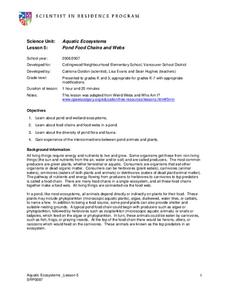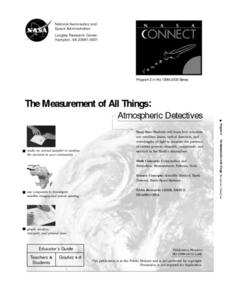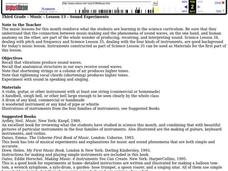Curated OER
Aquatic Ecosystems
Students study ponds and wetland ecosystems and examine the food chains and webs in them. In this aquatic ecosystems lesson students answer questions about the diversity of the flora and fauna in a pond.
Curated OER
WHY DO SOME THINGS FLOAT WHILE OTHERS SINK
Students explore how density can cause things to sink or float by experimenting with a jar, oil and corn syrup.
Curated OER
Energy Audits for the Elderly
Young scholars perform experiments to determine the nature of energy particularly in air, light and water. They conducted an energy audit using the Energy Audit Checklist and by looking at the school's bills for gas and power.
Curated OER
Popcorn Neutrino Lab
High schoolers parcticipate in a modeling activity that simulates the cyclical role of experimental and theoretical science. Initially, students measure the mass of popcorn. They also record predictions of the mass of the kernels after...
Curated OER
The Measurement of All Things: Atmospheric Detectives
Young scholars identify the characteristics of aerosols. Using remote sensing, they participate in an experiment in which they determine how the sun's radiation and elements in the atmosphere interact with one another. They also...
Curated OER
Investigation of Timbre
Students design an experiment to analyze the timbre of different instruments. In this physics lesson, students analyze the missing quality in sound. They discuss their results in class.
Curated OER
Energy Forms
Learners explore energy by participating in a science lab in class. For this energy form lesson, students define the different types of energy such as light, mechanical and sound while examining energy measuring tools in class. Learners...
Curated OER
Discovering the Mathematics of Sound
Students study the basic skills of algebraic manipulations. They practice the application of basic mathematics in science and determine the nature of good acoustics. They develop proposals for providing good acoustics and identify...
Curated OER
Relational Causality
Students explore the concept of Bernoullii's Principle and how it behaves. Have each student fold the piece of paper in half. Then have them place the paper like a tent on a smooth surface. Have them blow under it (they can use a straw...
Curated OER
Deadly Ascent
High schoolers explore some of Earth's extreme environments and the possible dangers they present. They describe some of the potential dangers found in extreme environments around the world. Students discuss ways to deal with potential...
Curated OER
The Drag of Drag
Students are introduced to drag. Then they summarize drag by saying that the drag is proportional to the square of the velocity. Students then solve problems an example of such a problem: Explain why swimming underwater is faster than...
Curated OER
Is it Partly Cloudy or Partly Sunny?
Students investigate the concept of weather and how it is created. They review relevant vocabulary related to weather. Students predict weather given slight background knowledge. The lesson includes background information for the...
Curated OER
Music
Third graders study sound waves and vibrations. They sing a silly round in three parts.
Curated OER
Smog City - Part I
Students apply an interactive smog visualization application, Smog City to see how ozone levels are related to population levels and emissions. They study associated vocabulary and complete a worksheet.
Curated OER
What Makes a Kite Fly?
Ninth graders compare the nature of forces of gravity, lift, thrust, and drag. They select proper materials for making a kite and attach a proper tail. Students interpret and summarize the observations made during the flight of the kites.
Curated OER
Aerodynamic drag
Learners construct a device that can launch spinning balls. One example would be a mailing tube with one side partially cut away, lined with sandpaper. Styrofoam balls should be used for the greatest effet. They are explained how a...















